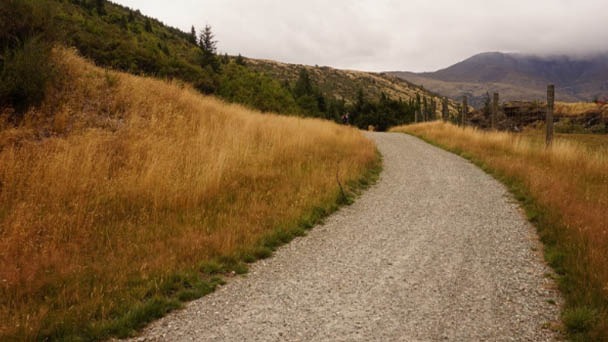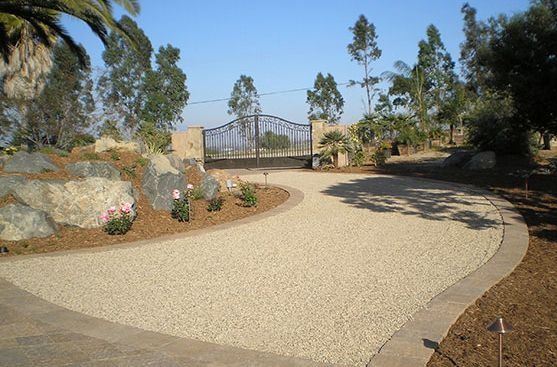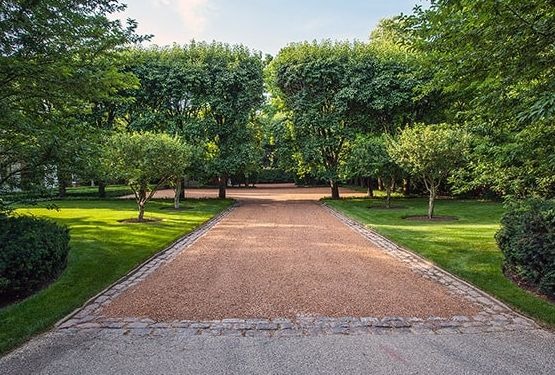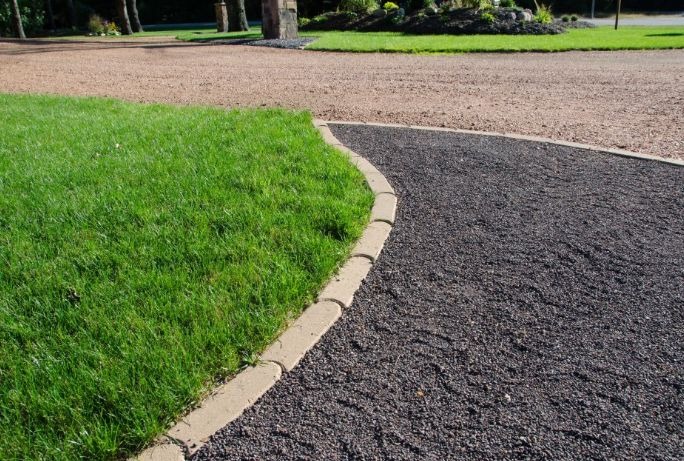Pros and Cons of Decomposed Granite Driveways - How to Harden
Written by Ivy
Jan 26 2023

Granite that has decomposed is one of the most widely used materials for driveway construction. From regular granite, decomposed granite is produced. It is a particular variety of granite, though, that is so weathered that it is brittle and breaks into smaller pieces with ease.
Sometimes, decomposed granite crumbles into particles so tiny that they resemble sand. Decomposed granite can be used in driveway construction in a variety of ways, despite the fact that it might not seem like a very durable material at first.
Types of Decomposed Granite

Following is a list of the three main categories of DG.
Natural Loose DG
This DG is a naturally occurring substance that hasn't been combined with any additives. Vibraplates are typically used to install and compact it. The particles can fuse and remain in place as a result. They are frequently used for parks, walkways, and seating areas.
Most people with limited resources frequently use this type because it is the least expensive. It enhances the aesthetics and beauty of a garden path.
Stabilized DG
Stabilizing substances are combined with stabilized DG to help hold the particles together and in place. The abrasive and hard-looking particles become consolidated and tightly packed. This lessens erosion and some other issues brought on by the use of DG.
Remember that even with the use of stabilizers, the main issues of erosion and damage brought on by debris are only partially eliminated.
DG With Resin
For high-traffic areas, this type is the most expensive and popular. It entails combining DG with resin to bind the particles together, creating a substance resembling asphalt. The texture changes, and the surface hardens. And the sandy appearance is gone.
Advantages of Decomposed Granite
I am aware that the focus of this article is supposed to be on the drawbacks of DG. However, in my opinion, it doesn't hurt to take a brief look at some of its benefits.
- It is easy to install
- It is available in a variety of colors
- DG is a good choice for xeriscaping
- It gives a natural appearance
- Loose DG is inexpensive
Disadvantages of Decomposed Granite
The main drawbacks of decomposed granite are listed below.
It Gets Muddy
When there is a lot of rainfall in the winter, decomposed granite frequently becomes muddy. Small pieces of granite and granite fines make up DG; this mixture has a high propensity to fuse together when there is water present. Due to this, DG becomes muddy instead of loose.
Gravels don't go through this process. It's a DG-specific issue. The addition of resins, however, may help to reduce it. But when you need DG in large quantities for a significant hardscaping project, this can be a difficult and expensive step.
It Has a Tendency to Grow Weeds
It has the ability to grow moss in addition to weeds. With DG, weeds and moss present a significant challenge. To get rid of the undesirable guests, you will need to rake it frequently. You should be aware that using DG on your patio does not make maintenance-free walkways like concrete do.
Your environment will look different with weeds and moss present, and the installed DG won't look as lovely as you had hoped. In order to prevent this, you must frequently rake it. If you have to do this by yourself, it might be exhausting.
It Has a Tendency to Erode
Unless used in conjunction with additives, DG has a very high propensity to erode. And over time, even when additives are used, it tends to deteriorate. It is constructed of weathered rocks that are easily broken into smaller pieces. This makes it prone to erosion, particularly in the winter when there is a lot of rain.
Your walkway, patio, or environment as a whole will change in appearance due to erosion, which reduces quantity. Depending on the kind of DG in question, this may take place quickly or gradually. Natural DG that doesn't contain any additives erodes more quickly than DG that does.
It is More Suitable in Certain Environments
In places with less rainfall, DG is more advantageous and suitable for use. Due to its nature, it is obvious why. When it rains frequently, the particles have a propensity to muddy up and erode over time.
DG retains water, which also affects its features, despite being permeable and allowing water to percolate and seep through to the ground. It's muddy and messy because of the water that has been retained. As a result, it might become difficult and uncomfortable to move around on foot.
It Requires Frequent Refilling
When using DG, you might need to periodically refill your patio or walkway. This is due to potential erosions that might happen over time.
When you have to refill with the same DG color, erosion becomes an even bigger challenge. Sometimes it can be very challenging to find the exact match. There may be several reasons why it is out of stock and won't likely be for a while.
Making plans in advance is one way to get around this. Obtain a few of the originals and keep them on hand as a backup.
Debris May Damage Floors
This often happens, particularly if you put DG close to your front door. Anyone, including your pet, can bring the granite inside. If you have hardwood floors, this could harm them. To stop this damage, you might need to put down a floor mat. In this situation, the debris will become trapped in the mat, and you will need to sweep it off frequently. Maintaining a clean environment will require more work as a result.
DG With Resin is Expensive
By combining DG with natural resin, most of its drawbacks can be reduced. But the cost is a separate issue all by itself.
When DG is combined with resin, an asphalt-like substance results, which is another issue. It may be less desirable for the original purpose it was needed for because the final product is more asphalt-like than DG-like.

Why Do People Use Decomposed Granite in Their Driveways?
Many homeowners find the benefits of a decomposed granite driveway to be appealing. You have a wide range of color options for your driveway, giving you more stylistic freedom. A few of the colors that are offered are yellow, brown, white, grey, and dark blue. It is also very affordable.
Crushed granite driveways are very affordable to buy and install, especially if you leave them unstabilized. It can, however, last for a very long time before needing to be replenished by adding stabilization. As opposed to the days of work required to resurface or reseal asphalt and concrete driveways, the installation process is also very quick.
Decomposed granite driveways are incredibly permeable and environmentally friendly, which is yet another major advantage. Stormwater can drain through it without any additional equipment needed for production or installation. It works wonders to prevent flooding in driveways and reduces the need for additional drainage. .
What Are the Downsides of Decomposed Granite Driveways?
Unstabilized decomposed granite has many drawbacks as a driveway material. It is less permeable if stabilization is not done properly. Even though the driveway is not excavated and stabilized with pavers, liquid will still drain from it, but much more slowly. Furthermore, when laid over plain grass, it actually promotes the growth of weeds.
The answer to the question "is decomposed granite good for driveways?" depends on how it's installed. For instance, when installed with stabilizing pavers, crushed granite has a much longer lifespan than when it is installed alone. Without stabilization, the decomposed granite will rut, spread, or harden over time to the point where it is impermeable and cannot drain. If loose granite is laid without pavers, rain, snow, UV rays, and traffic will wreak havoc on it.
Also easily spread is loose granite. Not only does it quickly turn to dust, but it also spreads and moves beyond the confines of your driveway. Your driveway may become rutted, bare, or filled with puddles as a result. Pavers allow you to prevent all of these problems.
What's the Best Way to Use Decomposed Granite in a Driveway?
The only way to construct a durable, useful driveway is to stabilize your decomposed granite with pavers. For instance, TRUEGRID creates products like TRUEGRID PRO LITE and TRUEGRID PRO PLUS, which can be used to effectively stabilize granite and enable it to perform to its fullest.
Both paving systems have a very straightforward installation procedure. In order to prevent gravel from migrating into the soil and to block weed growth from below, the driveway area is first excavated to a depth of 6 to 12 inches, depending on the drainage needs. A heavy roller is used to compact the gravel after it has been rolled into the excavation.
The interlocking permeable pavers are then placed over the top of the level pit and connected like LEGO blocks. Decomposed granite is then added to the pavers' tops and forced into the open cells using a heavy roller or vehicle. In addition to creating a level surface for driving on, this weighs the pavers down and prevents them from shifting.
Since they are made entirely of recycled plastic, TRUEGRID permeable pavers are environmentally friendly. They have the strength to last more than 60 years. They require very little upkeep and are capable of efficiently draining extremely heavy rainfall.

Frequent Questions About Decomposed Granite Driveway
Does Water Drain through Decomposed Granite?
Excellent water drainage is provided by DG. Decomposed granite can allow water to pass through and be absorbed. Decomposed granite effectively channels water away, so you don't have to worry about puddles forming.
Will Decomposed Granite Wash Away?
Put plastic edges on both sides of the driveway. Plastic driveway edging keeps the decomposed granite from washing away while also securing your driveway. Be sure to install steel or plastic edging around any driveway drainage as well. This will stop your DG from washing off your driveway and into the drainage system.
How Do You Keep Decomposed Granite in Place?
Granite can be installed with stabilized pavers or resins or pretreated. Your granite will stay put and be kept from spreading and eventually washing away if you use a stabilized paver. Your DG can be kept in place with a Gator stone bond, a straightforward one-coat application.
What is the Difference Between Crushed Granite and Decomposed Granite?
The same substance is used to create both crushed and decomposed granite. Crushed granite, on the other hand, has pointed edges and irregular shapes, making it more expensive than DG. In addition, DG is more valuable, cost-effective, and environmentally friendly than crushed granite.
Conclusion
With properly installed decomposed granite, you can achieve the clean appearance and aesthetic appeal of your driveway. If you want something organic and environmentally friendly, it is ideal for your driveway. Compared to other paving materials, it is additionally less expensive and requires less upkeep.
Latest Updated
- Benefits of Bugleweed - 7 Science-backed Health Benefits
- Bugleweed Dangers & Side Effects - Is It Poisonous?
- How to Plant Evergreen Trees - What You Should Know
- When to Plant Evergreens - Grow Guide for Evergreen Trees
- 12 Wonderful Evergreen Shrubs for Your Garden
- 12 Popular Evergreen Plants with Pictures for Beginners
- When And How To Prune A Lilac Bush Like a Pro
- How to Grow & Care for Lilac Vine (Hardenbergia Violacea)
- Japanese Lilac Tree (Syringa Reticulata) Care & Propagation Guide
- Shumard Oak Pros and Cons - What to Know
Popular Articles
- Winter maintenance of Antirrhinum Majus
- How to Grow Terminalia Mantaly Tree
- How to Grow and Care for Crossostephium Chinense
- How to grow Antirrhinum Majus in spring
- Peristeria Elata (Dove Orchid) Profile: Info & Care Guide
- Underwatered Snake Plant (Sansevieria Trifasciata) - Signs And How To Fix
- How to Care for Brazilian Jasmine Plant (Mandevilla Sanderi)
- How to Grow & Care for Graptopetalum Purple Delight in Summer
- Rosa Chinensis (China Rose): Plant Growing & Care Tips
- How to Care for Baby Sun Rose (Aptenia Cordifolia)